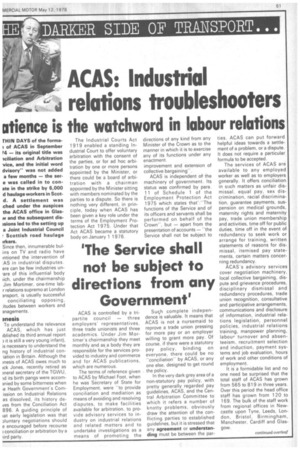THIN DAYS of the formaof ACAS in September F4 —
Page 59

If you've noticed an error in this article please click here to report it so we can fix it.
its original title was lciliation and Arbitration vice, and the initial word dvisory" was not added a few months — the sere was called in to conate in the strike by 6,000 d haulage workers in Scotd. A settlement was ched under the auspices the ACAS office in GlasN and the subsequent dismions led to the setting up a Joint Industrial Council • Scottish road haulage orkers.
Since then, innumerable bulins on TV and radio have intioned the intervention of AS in industrial disputes. ere can be few industries uniare of this influential body lich, under the chairmanship Jim Mortimer, one-time labrelations supremo at London 3nsport, is usually successful conciliating opposing. .itudes between workers and inagements.
anesis
To understand the relevance ACAS, which has just iblished its third annual report ) it is still a very young infant), is necessary to understand the ng history of industrial coniation in Britain. Although the !nesis of ACAS owes much to ick Jones, recently retired as !neral secretary of the TGWU, Id its birth pangs were accominied by some bitterness when le Heath Government's Cornission on Industrial Relations as dissolved, its history dees from the Conciliation Act 896. A guiding principle of iat early legislation was that Dluntary negotiations should e encouraged before recourse conciliation or arbitration by a lird party. The Industrial Courts Act 1919 enabled a standing Industrial Court to offer voluntary arbitration with the consent of the parties, or for ad hoc arbitration by one or more persons appointed by the Minister, or there could be a board of arbitration with a chairman appointed by the Minister sitting with members nominated by the parties to a dispute. So there is nothing very different, in principle, today when ACAS has been given a key role under the terms of the Employment Protection Act 1975. Under that Act ACAS became a statutory body on January 1 1976.
ACAS is controlled by a tripartite council — three employers' representatives, three trade unionists and three academics. Under Jim Mortimer's chairmanship they meet monthly and as a body they are responsible for the services provided to industry and commerce and for ACAS publications, which are numerous.
The terms of reference given to ACAS by Michael Foot, when he was Secretary of State for Employment, were "to provide conciliation and mediation as means of avoiding and resolving disputes, to make facilities available for arbitration, to provide advisory services to industry on industrial relations and related matters and to undertake investigations as a means of promoting the directions of any kind from any Minister of the Crown as to the manner in which it is to exercise any of its functions under any enactment.
improvement and extension of collective bargaining''.
ACAS is independent of the machinery of government. Its status was confirmed by para. 11 of Schedule 1 of the Employment Protection Act 1975 which states that' -The functions of the Service and of its officers and servants shall be performed on behalf of the Crown-, but — apart from the presentation of accounts — -the Service shall not be subject to Such complete independence is valuable. It means that ACAS is not a nursemaid to reprove a trade union pressing for more pay or an employer willing to grant more pay. Of course, if there were a statutory pay policy, binding on everyone, there could be no "conciliationby ACAS, or any one else, designed to get round the policy.
In the very dark grey area of a non-statutory pay policy, with pretty generally regarded pay guidelines, ACAS, and the Central Arbitration Committee to which it refers a number of knotty problems, obviously draw the attention of the conflicting parties to established guidelines, but it is stressed that any agreement or understanding must be between the par
ties. ACAS can put forward helpful ideas towards a settlement of a problem, or a dispute. It does not require a particular formula to be accepted.
The services of ACAS are available to any employed worker as well as to employers generally. It offers conciliation in such matters as unfair dismissal, equal pay, sex discrimination, racial discrimination, guarantee payments, suspension on medical grounds, maternity rights and maternity pay, trade union membership and activities, time off for public duties, time off in the event of redundancy to seek work or arrange for training, written statements of reasons for dismissal, itemised pay statements, certain matters concerning redundancy_ ACAS's advisory services cover negotiation machinery, local collective bargaining, dispute and grievance procedures, disciplinary dismissal and redundancy procedures, trade union recognition, consultative and participative arrangements, communications and disclosure of information, industrial relations legislation, personnel policies, industrial relations training, manpower planning, labour turnover and absenteeism, recruitment selection and induction, payment systems and job evaluation, hours of work and other conditions of employment.
It is a formidable list and no one need be surprised that the total staff of ACAS has grown from 565 to 819 in three years. Over this period the head office staff has grown from 120 to 169. The bulk of the staff work from regional offices in Newcastle upon Tyne, Leeds, London, Bristol, Birmingham, Manchester, Cardiff and Glasgow.












































































































